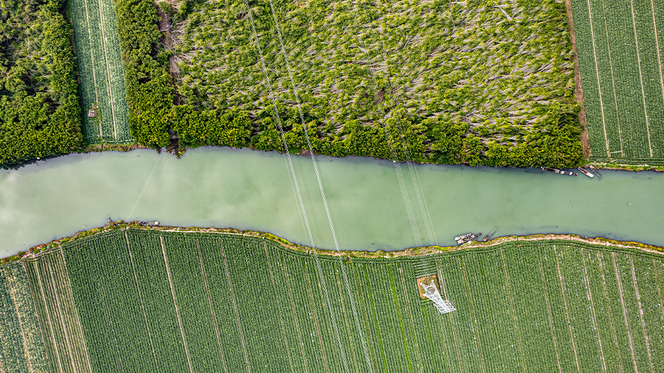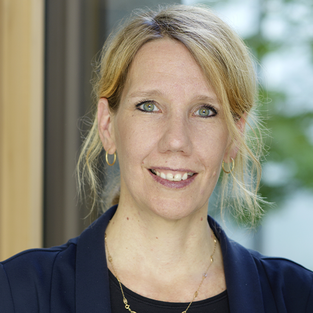innovate! center

With the funding program „innovate! center“, we support the development of efficient transfer structures at universities.
Flexible, private-law models are intended to sustainably accelerate research transfer and serve as good-practice examples.
innovate! center 2026
„Transformation Space: Resilient Water- and Soil Systems of the Future“
Our goal is to develop practical solutions under real-world conditions that effectively combine ecological functions – such as carbon sequestration, biodiversity, or water retention – with societal and economic requirements like food security, water availability, and energy supply.
The program supports concepts that establish robust transfer structures and strengthen collaborative partnerships on an equal footing between science, practice, and society.
Background and Vision
The major challenges of our time, such as climate change and resource scarcity, can only be addressed through the interplay of research, business, and society. In Germany, however, there is still a need for action to quickly and effectively transfer scientific knowledge into practice. With the „innovate! center“ program, the Joachim Herz Foundation provides structural support to accelerate the transition from basic research to market readiness at universities and to promote scientifically sound solutions.
The launch of the funding program was marked by the establishment of the „matena innovate! center“ at the University of Bremen in 2024 as a non-profit limited liability company (gGmbH). As the foundation’s largest structural project to date, it also serves as a reference model for the implementation of private-law transfer structures.
Focus for 2026
Water and soil systems are increasingly exposed to multiple, simultaneous pressures: from droughts and heavy rainfall to pollutant inputs, soil compaction, and overuse. These are not only ecological challenges—they also involve aspects such as supply security and economic stability. The systems are so complex that close, collaborative partnerships between science, business, and society are essential to jointly develop and implement practical solutions. Particularly in rural areas, regional knowledge and strong networks play a key role in ensuring continuous, reciprocal, and productive exchange between science and practice.
The planned „innovate! center“ aims to serve as a collaborative transfer structure that brings diverse stakeholders closer together and creates a shared framework by integrating regional characteristics and the expertise of all participants on an equal footing. Based on this foundation, transformation processes can be shaped more effectively, and the transfer of scientific knowledge into viable regional solutions – such as for agriculture and forestry – can be supported.
What we support
We support innovative, practical approaches that address the closely interconnected resources of water and soil together, while combining ecological functions such as biodiversity, water retention, or carbon sequestration with societal and economic requirements like food security, water availability, and energy supply. The goal is to transform these approaches into transferable, cross-sector concepts and practical solutions and to test them under real-world conditions. Examples include:
- Strategies for erosion control, sustainable water management, and optimized material cycles.
- Pilot projects for multifunctional landscapes (e.g., agroforestry systems, re-wetted peatlands).
- Practical strategies for the use, preservation, and restoration of soils, translating scientific findings on carbon and water storage, erosion control, and nutrient cycles into effective measures.
- New transfer formats and pilot projects that promote exchange between science, practice, and society and enable the design of multifunctional landscapes.
The planned center is intended to be structured as a non-profit transfer organization under private law in the legal form of a gGmbH, providing a shared, collaborative framework while enabling flexible, fast, and entrepreneurial action with the involvement of the applying university and additional partners.
Who is eligible for funding?
The funding offer is aimed at German universities together with practice partners who have expertise in water and soil systems. It is particularly directed at locations that already collaborate with local practice partners and can demonstrate research results with recognizable transfer potential, in order to consolidate and further professionalize these within the „innovate! center“.
What does the funding include?
The structural funding supports the establishment of a collaborative transfer structure with up to €5,000,000, in order to embed transdisciplinary, practice-oriented research activities and their transfer structurally at the location. The funding primarily serves to build and professionalize the transfer structure, but at the same time enables the implementation of specific research and transfer projects within the „innovate! center“.
The funding period is generally five years and can be extended to up to ten years if necessary.
Detailed requirements regarding the structural framework of the funding can be found in the call for proposals.
Documents
Application
The application phase runs till April 20, 2026.
Selection Process
The selection of university partners with the most promising projects is carried out by an independent expert jury in a two-stage process:
- Written Application: In the first step, the jury reviews the written applications and makes a preliminary selection of the best submissions.
- Project Pitches: If the initial review is positive, an invitation will be issued in early June 2026 for an in-person presentation of the project in July 2026 in Hamburg. Based on these presentations, the jury will make its final recommendation.
The final decision rests with the Joachim Herz Foundation, based on the jury’s feedback. Detailed information on the criteria and requirements can be found in the call for proposals.
Dates
All 2026 dates at a glance:
- January 12 to April 20: Application period
- Early June: Invitation of the most promising candidates to present in Hamburg
- July 15: Pitches in Hamburg and announcement of selected university partners
- July to December: Establishment of the gGmbH, including all required formalities by the university and participating founding partners (e.g., shareholder agreement, cooperation agreement, recognition of non-profit status)
- December: Completion of the funding agreement with the gGmbH and the Joachim Herz Foundation
Contact
